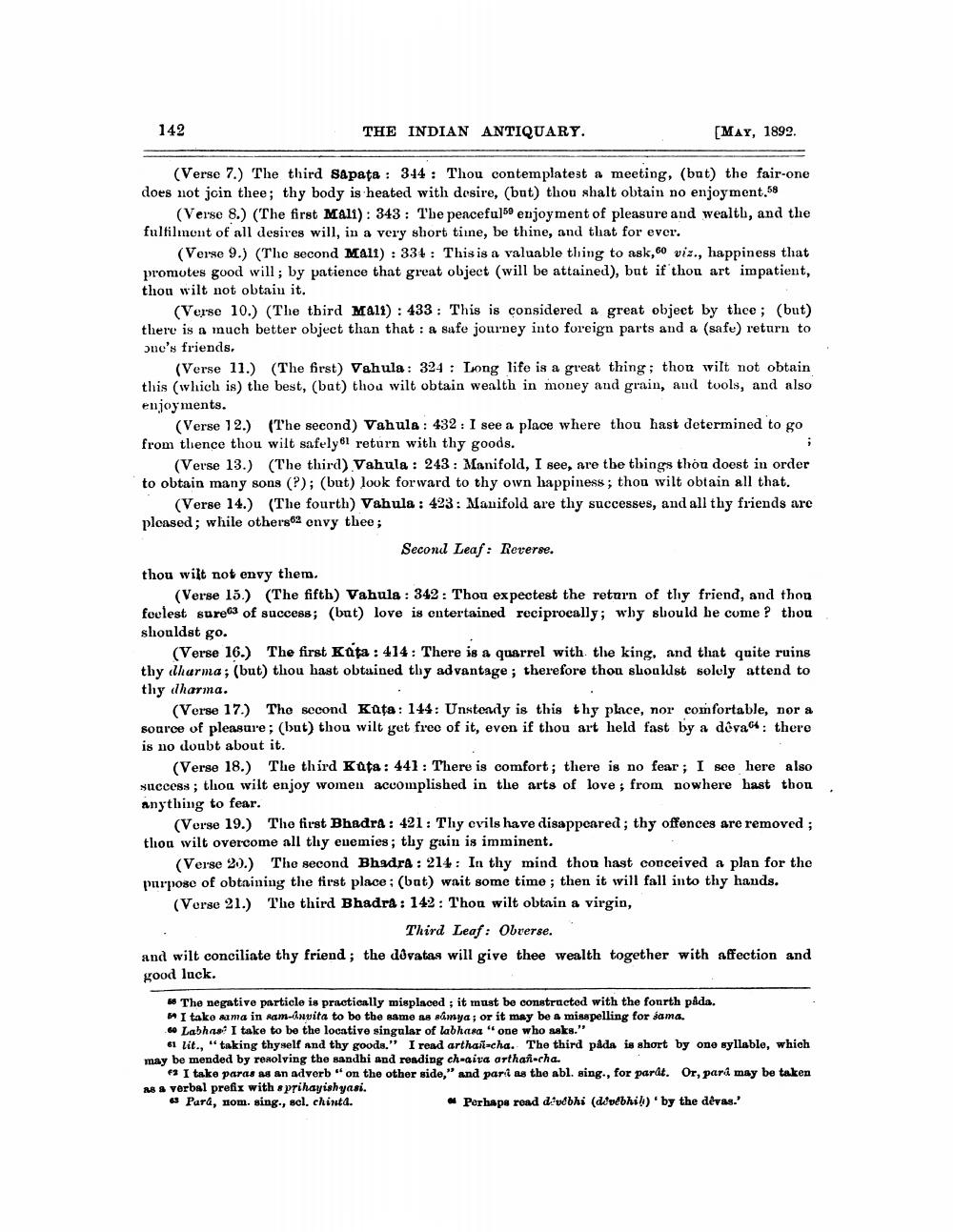________________
142
THE INDIAN ANTIQUARY.
[MAY, 1892.
(Verse 7.) The third sapata : 344 : Thou contemplatest a meeting, (bat) the fair-one does not join thee; thy body is heated with desire, (but) thou shalt obtain no enjoyment.58
(Verse 8.) (The first Mali): 343 : The peaceful59 enjoyment of pleasure and wealth, and the fulfilment of all desires will, in a very short tiine, be thine, and that for ever.
(Verse 9.) (The second Mall): 334: This is a valuable thing to ask,60 viz., happiness that promotes good will; by patience that great object (will be attained), but if thou art impatient, thou wilt not obtain it.
(Verse 10.) (The third Mall) : 433 : This is considered a great object by thee; (but) there is a much better object than that : a safe journey into foreign parts and a (safe) return to one's friends,
(Verse 11.) (The first) Vahula: 324 : Long life is a great thing; thou wilt not obtain this (which is the best, (bat) thou wilt obtain wealth in money and grain, and tools, and also enjoyments.
(Verse 12.) (The second) Vahula : 432: I see a place where thou hast determined to go from thence thou wilt safelyél return with thy goods.
(Verse 13.) (The third) Vahula: 243: Manifold, I see, are the things thou doest in order to obtain many sons (?); (but) look forward to thy own happiness; thou wilt obtain all that.
(Verse 14.) (The fourth) Vahula : 423: Manifold are thy successes, and all thy friends are ploased; while others62 envy thee;
Second Leaf: Reverse. thou wilt not envy them.
(Verse 15.) (The fifth) Vahula : 342: Thou expectest the return of thy friend, and thoa feelest sure of success; (bat) love is entertained reciprocally; why should be come ? thou shouldst go.
(Verse 16.) The first Kata : 414: There is a quarrel with the king, and that quite ruins thy dharma; (but) thou hast obtained thy advantage; therefore thou shouldst solely attend to thy dharma.
(Verse 17.) The second Kata: 144: Unsteady is this thy place, nor comfortable, nor a source of pleasure; (but) thou wilt get free of it, even if thou art held fast by a deva64: there is no doubt about it.
(Verse 18.) The third Kata: 441: There is comfort; there is no fear; I see here also success; thou wilt enjoy women accomplished in the arts of love, from nowhere hast tbou anything to fear.
(Verse 19.) The first Bhadra : 421: Thy evils have disappeared; thy offences are removed ; thou wilt overcome all thy enemies; thy gain is imminent.
(Verse 2..) The second Bhadra: 214: In thy mind thou hast conceived a plan for the purpose of obtaining the first place : (bat) wait some time; then it will fall into thy hands. (Verse 21.) The third Bhadra : 142: Thou wilt obtain a virgin,
Third Leaf : Obrerse. and wilt conciliate thy friend; the dôvatas will give thee wealth together with affection and good luck.
68 The negative particle is practically misplaced ; it must be constructed with the fonrth påda.
I take suma in sam-invita to be the same as samya; or it may be a misspelling for sama. 6. Labhas? I take to be the locative singular of labhasa "one who saks."
61 lit., "taking thyself and thy goods." I read arthai-cha. The third pada is short by one syllable, which may be mended by resolving the sandhi and reading ch-aiva arthaf-cha.
I take paras as an adverb " on the other side," and part as the abl. sing., for pardt. Or, para may be taken as a verbal prefix with sprihayish yasi. « Para, nom. sing., scl. chinta.
Perhape road div&bhi (dvébhih) by the devas.'




